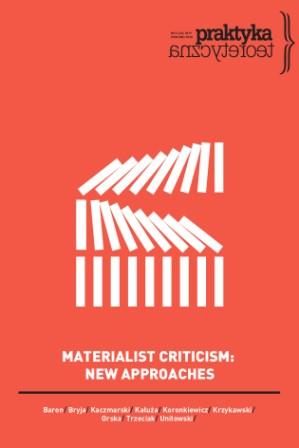Materiality as Resistance and Protection: The Case of Andrzej Sosnowski
Materiality as Resistance and Protection: The Case of Andrzej Sosnowski
Author(s): Marta KoronkiewiczSubject(s): Poetry, Polish Literature, Philosophy of Language, Philology, Theory of Literature
Published by: Uniwersytet Adama Mickiewicza
Keywords: Andrzej Sosnowski; Adam Ważyk; poetic form; new formalism; politics of poetry; materiality of poetry;
Summary/Abstract: This article elaborates on a conception of poetic form derived from the work of the contemporary Polish poet Andrzej Sosnowski, in order to further our understanding of form as something material and dynamic rather than static and purely “textual”. Sosnowski often comments on the materiality of poetry as a useful metaphor that allows us to grasp its peculiar semi-autonomous condition; hence his eagerness to employ the metaphors of poetry as choreography, bodily gesture or action. By putting Sosnowski’s comments in the context of contemporary debates on form and matter in literature—from historical materialism and its traditionally complicated relationship to formalism to a more traditional philological approach to the so-called “new materialisms”—I attempt to point out a possibility of transcending the usual tensions and divisions organising these debates. Here, I find particularly useful the notion of “affordances,” as used by Caroline Levine, as well as the techno-poetic approach of Nathan Brown, and certain conceptual tools offered by the “new formalist” movement. Finally, I reference the work of Adam Ważyk, Sosnowski’s predecessor and one of his main inspirations, in order to show the poetic form as a way of protecting/preserving certain forms of life. Ważyk’s idea of form as a means of resisting entropy provides a unique insight into the more practical aspects of the politics of poetic form.
Journal: Praktyka teoretyczna
- Issue Year: 2019
- Issue No: 34
- Page Range: 151-170
- Page Count: 20
- Language: English

